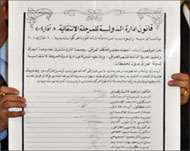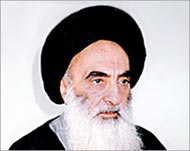Mixed reaction to Iraq signing
Mixed reaction followed the signing of the Iraqi interim constitution as many hailed the step, but top Shia cleric said it is an “obstacle”.

The 25 members of Iraq’s US-appointed Governing Council signed the interim constitution earlier on Monday in a ceremony in Baghdad that was twice postponed.
Among the first to react to the signing was Saudi Arabia. “The council of ministers expresses its satisfaction with the agreement on Iraq’s interim constitution and its signature,” by the Governing Council, said a statement released after the weekly cabinet meeting.
The cabinet “hopes that the signing of the interim constitution will lead to establishing an independent government and to a return of sovereignty and independence for brotherly Iraq,” the statement added.
Iran’s reaction
Iran was also quick to react praising the document as a key step towards ending the US occupation of its neighbour.
“The signing of the Iraqi interim constitution is an effective
step in the transfer of power to the Iraqi people, and Iran welcomes this favourably,” foreign ministry spokesman Hamid Reza Asefi said in a statement carried by the state news agency IRNA.
 |
|
A member of the Governing |
The spokesman, however, gave no hint as to what Iran’s reaction was to the text itself.
Asefi also repeated Iran’s wish to see “the achievements of the interim Iraqi Governing Council reach more constructive levels so that general elections can be held in Iraq.”
“The Islamic republic of Iran believes that the rapid organisation of general elections, the departure of foreign occupation forces and the return of power to Iraqis to run their own affairs will ensure security, well-being and development,” he said.
Jordan’s welcome
Jordan also welcomed the signing as a “step forward” that would help Iraqis recover their sovereignty and preserve their unity.
“Any step decided by the Iraqi people and their authorities that helps them recover their responsibilities and authority quickly and contribute to rebuilding Iraq’s national institutions is a step forward,” said government spokeswoman Asma Khudr.
“We hope this will help the Iraqi people recover their sovereignty as soon as possible as well as preserve their unity, security and safety,” she added.
Kurds celebrating
 |
|
Al-Sistani insists only an elected |
Iraq’s Kurds celebrated the signing of the constitution which enshrines their right to autonomy in three northern provinces and guarantees minority rights.
“I am ecstatic – an Iraqi constitution came to light that recognises all the rights of the citizens who live in Iraq,” said businessman Uthman Faraj in the northern town of Arbil.
But some from the Kurdish minority, long oppressed by Saddam Hussein, were also concerned Iraq’s Shia majority may
try to backtrack on some elements of the constitution.
In the oil-rich city of Kirkuk, where Kurds and other ethnic
groups are competing for power, several thousand people marched through the streets carrying Kurdish flags and chanting “Long live Kurdistan”.
“It is the first time that the Kurdish language is officially
mentioned in the Iraqi constitution. We have really gained
guarantees that allow us to become first class citizens,” said an 18-year-old student, Muhammad Umar.
‘Obstacle’
|
“Any law prepared for the transitional period will not have legitimacy until it is approved by the elected national assembly.” Ayat Allah Ali al-Sistani, |
But Iraq’s most influential Shia Muslim cleric said the constitution made drafting a permanent charter for the country harder.
“This (law) places obstacles to arriving at a permanent constitution for the country that preserves its unity and the
rights of its people, in all their ethnicities and sects,” said
a statement from Ayat Allah Ali al-Sistani.
He also insisted that only an elected body should sign off on further legislation in Iraq.
“Any law prepared for the transitional period will not have legitimacy until it is approved by the elected national assembly,” the statement said.